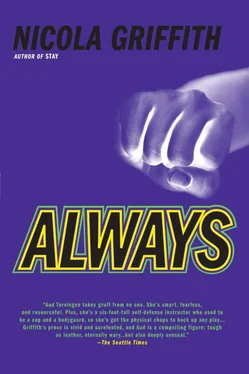“Do you want to play with it?” he said.
“I don’t want to disturb your film.” He looked blank. “The movie.”
“I’ve seen it before,” he said in that world-weary way children have. “Three times yesterday. Go on, shoot it.”
I pointed at the fireplace and squeezed. The arrow shot out with a satisfying phhtt and stuck briefly to the painted brick. I slotted another arrow and squeezed. Again, it clung for a microsecond before dropping to the hearth.
“Does it help if you lick the ends?”
“No,” he said, “but if you shoot at a window or something, it sometimes sticks.”
I got up and went to the other side of the room, and shot at the window. The arrow stuck on the glass.
“Yes!” he said, and we grinned at each other. The arrow fell off. “Try that big booger. You have to stick it on the outside, not the inside.”
The big booger was a torpedo-sized missile slung beneath the arrows. It had a hole in its tail that fitted over the muzzle, rather than into the barrel.
“You gotta aim it up,” he said. “It flies different.”
A child who appreciated ballistics. It had never occurred to me to wonder if Luz would. I aimed the length of the room and it went sailing majestically into the coat tree, a good yard to the left of where I’d aimed. He jumped up and scrambled to get it. “My turn.”
I gave him the gun.
“Okay,” he said. “Come and watch this.”
Gun in his right hand and remote in his left, he squinted carefully down the barrel and squeezed the butt and pressed PAUSE at the same time. The arrow stuck, right on the frozen fish’s tail fin. “Huh,” he said. “A flesh wound. Tails don’t count, only a tap in the hat.”
A tap in the hat. Where did a five-year-old pick up the language of hired killers? School? What was Luz learning that I didn’t know about?
“Now watch me off the TV with this big booger.” He carefully fitted the torpedo. He missed on his first try, but not by much. “Oh, yeah. You can laugh, but I’ll get you. You better start squealing for mercy, ’cause I’m gonna get you.”
This time he knelt and aimed with both hands.
“Die, sucker!” The missile bounced cleanly off the center of the screen. “Oh, yeah. Oh, yeah. It’s dead. Never coming back.”
Kick walked in with a tray. “Time for soup,” she said.
While David watched the rest of the fish film, Kick and I cleared away the dishes. “I’ll try to be as quick as I can,” she said. “If he gets cranky, there’s ice cream, and don’t forget he has those other two movies.”
“Right.”
She smiled, but it was distracted, harried. “Just don’t try to parent him, okay? He hasn’t had any of that from his mom and dad. It’ll just confuse him. I have to go. Are you sure you’ll be all right?”
"Absolutely,” I said. I held her, palm against her spine. I imagined a neat, rubbery little tumor, like a latex robin’s egg, that would just pop out when you opened the skin.
I WAS LYINGon the floor and David was asleep on the sofa when she got home. Gauze and medical tape flashed white in the crook of her left arm.
“Christ,” she said, crossing immediately to the sofa. “Is he dead? What did you do to him?”
I sat up. “Nothing. He’s asleep.” She looked down at David dubiously. He had his thumb in his mouth. I put my arm around her waist. She leaned into me and her muscles softened little by little. She felt warm.
I stroked the side of her arm. “Blood draw?”
“IV for the MRI. Some kind of contrast thing.”
“Big Band-Aid.”
“They had to try twice.”
A blue Mini screeched to a halt outside the house—on the side of the street where no one was supposed to park—and the driver honked and left the motor running. Like a dog who recognizes the sound of his master’s footsteps, David stirred.
Kick picked him up. “Mom’s here,” she said, but he was still floppy, asleep with his eyes open. She turned to me. “Where’s his stuff?”
I picked up his backpack and held it out.
The horn honked again. “Bring it. You can meet the family.”
But all I saw of Maureen was an artificially bouncy river of strawberry blond hair and bangles flashing on her right wrist as she leaned over and shoved open the passenger door. All I heard was a “Yeah, hi,” to Kick’s introductions, and “Just put him in his seat, Kick, for Chrissakes. I’m late.” It was Kick who snapped the seat belt buckles and kissed David on the cheek, and Maureen was revving the engine even before Kick slammed the door.
THE PUBwas air-conditioned. The darts were the kind they always keep behind the bar: cheap aluminium barrels coated with a faux brass finish, plastic shafts, plastic flights. I threw a one, a five, and then, finally, a twenty. I pulled them out, chalked up my sad score, and handed the darts to Kick.
“Inferior darts,” I said.
She just smiled and walloped in a twenty, a triple twenty, and triple nineteen. It wasn’t a fluke. She’d already beaten me soundly in our first game. “One hundred and thirty-seven,” she said in a sweet voice. “Mark it up.” I did. It left her with thirty-two, the perfect closing position.
I threw again, and managed a respectable score of sixty-one.
She took two darts to finish: a sixteen and double eight. “Should have done it with one,” she said, “but, like you said, they’re inferior darts.”
We took our beer to a table.
“So,” she said, “you survived trial by nephew.”
I nodded.
“Sorry I was so late. But Christ, when I came in and saw him lying so still on the couch… He’s never slept at my house before. How did you do that?”
“I took him into the garden for some good, clean, healthy fun in the fresh air and sunshine.” She gave me a look. “All right: we shot at each other with the Nerf gun. Moving targets.” We’d also shot at squirrels, but she didn’t need to know that. We’d missed, anyway.
We sipped the rich, nutty beer. Fuller’s Extra Special Bitter, served in imperial pints.
“Was it a problem with the scan that made you late?”
“Just the IV. I have pathetic veins.” She shrugged. “Hopefully it’ll be worth it. They said the gadolinium will… They said…” She stared into space. The tips of her fingers, where they wrapped around her glass, were pale. “They said the gadolinium would make the lesions show up more clearly. Lesions. Christ.”
Two tables away, three women and a man burst out laughing at the end of some joke. “Drink some beer,” I said. She did. I did. “They think you have lesions?”
“Brown-Sequard syndrome.”
Which was a set of symptoms, not a diagnosis: weakness or paralysis on one side of the body, numbness on the other, caused by a spinal lesion. But the spinal lesion could be the result of a tumor, or MS, or trauma, or infection with something like TB. Had she had a cough recently? Or smelled oranges in the middle of the night, or newly mown grass, or heard music? Did her arm ever get weak? How was her vision? I opened my mouth, then shut it, and tried to imagine how she felt. “Do you want to talk about this?”
“No.”
I nodded. “All right. Just tell me when you’re due to get your results.”
“Tomorrow. I have to go back to Northwest. Eleven o’clock.”
The patient was always the last to know. By now, half a dozen people would already have seen the results. Some radiologist would have shoved the film up under the steel clip at the top of the light panel and given it a preliminary read, would have looked at the pictures of the delicate sheathing on her spine, the thin image-slices of her brain, and would be sitting at home eating a Reuben sandwich and saying to their sweetie, Saw a sad case today, hon. She’s only twenty-eight… They would have sent the information to her doctors, where it would be printed and read by nurses, then handed off to receptionists and neatly filed.
Читать дальше












